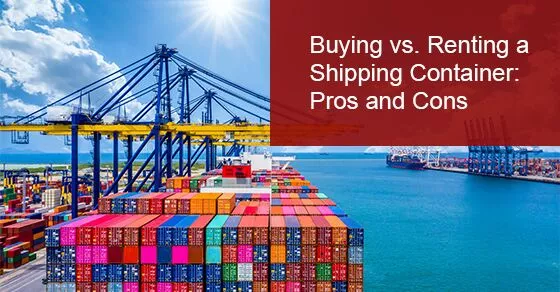If you’re embarking on a home improvement project, you may be considering whether to rent or buy a local storage container. Each option has its own set of pros and cons, and it’s important to consider them before making a decision. Here’s a breakdown of the pros and cons of renting vs. buying local storage containers:
Renting Local Storage Containers:
Pros:
Cost-effective: Renting a local storage container is typically more cost-effective than buying one, especially if you only need it for a short period of time.
Flexible rental terms: Rental companies offer flexible rental terms, ranging from a few days to several months, so you can choose the option that best fits your needs.
No maintenance costs: When you rent a local storage container, the rental company is responsible for maintenance and repairs, so you don’t have to worry about additional costs.
Variety of sizes and types: Rental companies offer a variety of sizes and types of containers, so you can choose the option that best fits your project needs.
Cons:
Limited customization: When you rent a local storage container, you’re limited to the options provided by the rental company. If you have specific customization needs, you may need to purchase a container instead.
No long-term ownership: When you rent a local storage container, you don’t own it, so you won’t be able to use it for future projects without renting it again.
Higher rental fees over time: If you need to rent a local storage container for an extended period of time, the rental fees can add up and become more expensive than buying a container.
Buying Local Storage Containers:
Pros:
Long-term ownership: When you buy a local storage container, you own it and can use it for future projects without additional rental fees.
Customization options: Buying a local storage container allows you to customize it to your specific project needs, such as adding shelving or ventilation.
Resell value: Local storage containers can hold their value over time, so if you no longer need it, you can resell them and recoup some of your initial investment.
Cons:
Higher upfront costs: Buying a local storage container can be more expensive upfront, especially if you need a larger or customized container.
Maintenance and repair costs: When you own a local storage container, you’re responsible for maintenance and repairs, which can add additional costs over time.
Limited storage capacity: Once you’ve purchased a local storage container, you’re limited to the storage capacity of that specific container. If you need more storage space in the future, you’ll need to purchase an additional container.
Limited storage options: Buying a local storage container limits you to the specific container you’ve purchased, so you won’t be able to switch to a different type or size of the container without purchasing a new one.
Ultimately, the decision to rent or buy a local storage container depends on your specific project needs and budget. If you only need a container for a short period of time, renting may be the most cost-effective option. However, if you anticipate needing a container for future projects, or have specific customization needs, buying may be the better choice. Consider the pros and cons carefully before making a decision and remember to factor in any additional costs, such as maintenance and repair fees or long-term rental fees.

